Politics
Ukraine’s Orthodox church reels from political storm over Russian ties
Published
4 months agoon
By
Ekwutos Blog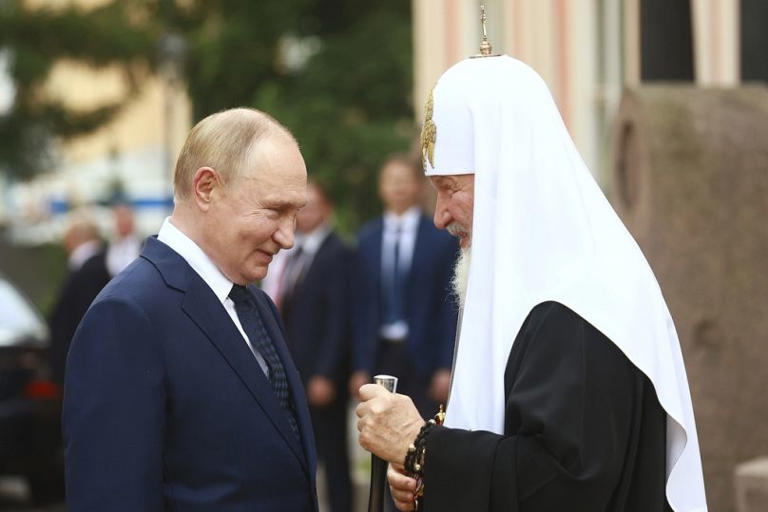
Questions surrounding the state of the Eastern Orthodox Church in Ukraine and its links to the Kremlin have made it descend from the spiritual realm into a fierce political arena replete with malign influence, propaganda and deception, just like during the Soviet times.
The political controversy that has been highlighted by Russia’s full-scale invasion of Ukraine in early 2022 came to the fore last August, when Kyiv enacted a bill set to restrict the activities of the Ukrainian Orthodox Church under the Moscow Patriarchate.
According to Ukrainian and Western security services, this branch of the Orthodox Church — to be differentiated from the autocephalous Orthodox Church of Ukraine — has been directly linked to the Kremlin and the Russian intelligence agency FSB,* maintaining the close collaboration between church and state in the Soviet Union.
“The archives documents that can prove these ties and that were accessible to the historians concern only the Soviet times,” said Christine Dugoin-Clément, a researcher at the Risk Chair of the Sorbonne Business School and at the French National Gendarmerie Officers’ School.
However, “the (Russian Orthodox) Church has an extremely widespread network on the Ukrainian territory that can gather information directly from the field. During a war, any information can have tactical military relevance and, at a later stage, strategic importance.”
Dozens of priests belonging to the Ukrainian Orthodox Church of the Moscow Patriarchate have been convicted by Ukrainian courts for collecting military information and passing it to the Russian military intelligence agency GRU.
Some of these priests have been swapped with Ukrainian war prisoners and sent to Russia.
National security and religious freedom
The Ukrainian bill on protecting the country’s constitution in religious affairs has a clear and openly defined target: banning the Moscow church’s activities in Ukraine due to its links to the Kremlin and its role as a supporter of its war in the neighbouring country.
“Given that the Russian Orthodox Church is an ideological continuation of the regime of the aggressor state, an accomplice to war crimes and crimes against humanity committed on behalf of the Russian Federation and the ideology of the ‘Russian World’, the activities of the Russian Orthodox Church in Ukraine are prohibited,” the law states.
This has caused concern among some of the Christian faithful abroad, who are afraid that this law could set a dangerous precedent for all religious freedoms.
In its defence, the Ukrainian government has recently pointed out that the restrictions will not be imposed on Moscow’s Patriarchate worshippers in Ukraine who are willing to officially and openly condemn the Russian invasion and the Kremlin regime’s policies.
The Ukrainian Greek-Catholic Bishop of Saint Volodymyr the Great in Paris, Hlib Lonchyna, told Euronews that the Ukrainian bill doesn’t violate religious freedom.
“it aims to protect our country against a country that is waging a war on us. And the bill is set to crack down on and forbid the (hostile) activities carried out in Ukraine by the religious organisations, bishops and priests that are directly connected to the war,” he said.
“Some of these people communicate to the enemy the strategic positions of the Ukrainian army and of the location of the Ukrainian infrastructures.”
The Vatican opines
Blessed by Byzantine rites like the Orthodox Church, yet led by the Roman Catholic pontiff, the Greek-Catholic Church in Ukraine actually knows what it means to be in Moscow’s crosshairs and what a free Kyiv offers to its faithful.
With its stronghold in Lviv and parts of western Ukraine, the Christian confession was officially suppressed in 1946 under the rule of Josef Stalin, having its historical dioceses’ properties and premises handed over to the Moscow Orthodox Patriarchate.
After its priests and faithful returned from exile in the late 1980s, the Greek Catholics revamped, becoming strong proponents of Ukrainian independence.
Yet, for the church, Pope Francis’ criticism of the Ukrainian ban against the Moscow Patriarchate, saying he “feared for the freedom of those who pray,” also resonated strongly.
However, Bishop Lonchyna remains sceptical about the pope’s fears.
“There is a very strong Muscovite lobby in Rome (at the Vatican). And the Holy Father has many advisers,” he explained.
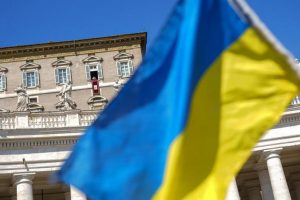
A person waves a Ukrainian flag as Pope Francis recites the Angelus noon prayer from the window of his studio overlooking St.Peter’s Square, at the Vatican Andrew Medichini/Copyright 2022 The AP. All rights reserved
He was quick to point out that matters are not that black-and-white: not all Ukrainian Orthodox worshippers that remained under the Moscow Patriarchate are pro-Kremlin, he said.
“Among the soldiers serving in the Ukrainian army there are Orthodox worshippers from the Moscow Patriarchate and from the Kyiv Patriarchate, Greek and Roman Catholics, Protestants, along with Muslims and Jews. They are all fighting loyally for the independence of Ukraine,” Bishop Lonchyna explained.
Why does Moscow think it should still have a say in Ukraine?
Unlike Catholics, who are all ruled by the Vatican, Eastern Orthodox Christians can ask for an independent jurisdiction from other Orthodox churches, known as autocephaly.*
This form of independence is granted when the Orthodox church in any country — especially in newly-independent states — asks for the seal of the autocephaly (also known as the Tomos) from the Ecumenical Orthodox Patriarchate in Istanbul and its recognition by the other independent Orthodox churches.
“According to an ecumenical principle established more than 10 centuries ago, a change of the political status of a territory should bring a change of its ecclesiastical status,” Dr Nikos Kouremenos, a theologian from the University of Athens, told Euronews.
This ancient principle has been applied at the birth of most independent countries with a significant Eastern Orthodox population in the last two centuries.
This means that until 1991, Ukraine, as well as the rest of the Soviet Union, was formally — in the eyes of the Orthodox world — under the Patriarch of Moscow.
However, when Ukraine declared independence, the question of its ecclesiastic autocephaly became a highly controversial issue entwined with the Ukrainian struggle to escape Russia’s desire for control.
At the same time, Kyiv carries significant spiritual meaning for many Eastern Slavs.
Prior to the existence of Russia and Moscow, Kyivan Rus was the centre of the Slavic world and Eastern Orthodoxy as the first Eastern Slav state, which then converted to Christianity under the Grand Prince of Kyiv Volodymyr the Great in the 10th century.
The Kyivan Rus Orthodox faithful constructed a number of holy places of key historical significance, such as the Monastery of Pechersk Lavra and the Cathedral of Saint Sophia.
Prince Volodymyr was baptised by Byzantine priests in Chersonesos, then a Greek city near today’s Sevastopol in Crimea.
As the autocephalous Orthodox Church of Ukraine rose to prominence post-independence, it was places like Pechersk Lavra where the Moscow Patriarchate tried to flex its influence and maintain control over, particularly after the 2014 Maidan Revolution.
Its attempts on influencing matters in Kyiv were on full display when, early on in Russia’s full-scale invasion of Ukraine, in March 2022, the Ukrainian security agency SBU raided the catacombs’ labyrinths of Pechersk Lavra, searching for pro-Russian weapons hideouts.
The Tomos and the ‘Thermos’
It took almost three decades of intense talks amid the Moscow Patriarchate’s subversion for Kyiv’s church to receive a Tomos declaring its autocephaly from the Ecumenical Patriarch Bartholomew.
On Epiphany, in January 2019, the Tomos was delivered to the Ukrainian Metropolitan Epiphanius I under the proud watch of then-Ukrainian President Petro Poroshenko.
The former Ukrainian head of state boasted that the autocephaly for the Kyiv Church was his personal diplomatic success.
Volodymyr Zelenskyy, then his political rival, derided the Tomos by calling it the “Thermos”, taking a jab at Poroshenko’s ecclesiastical enthusiasm amid a fiesty presidential election campaign.
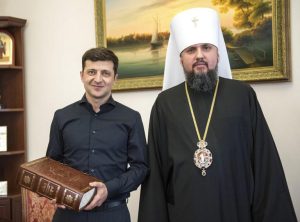
April 30, 2019, Volodymyr Zelenskiy, left, poses for a photo with Metropolitan Epiphanius, head of the Orthodox Church of Ukraine, in Ki AP/AP
However, Kyiv’s autocephaly has been recognised only by a minority among the 15 official Orthodox Churches: Cyprus, Greece, and Alexandria of Egypt. Moscow still regards it as a “schismatic group”.
“The Orthodox world is clearly divided when it comes to the Ukrainian religious question,” Kouremos explained.
“For instance, some Orthodox churches that can be considered as satellites of Moscow, like the Serb and the Syrian Patriarchates of Belgrade and of Antioch respectively, have openly rejected the idea of an autocephalous Kyiv Orthodox Church,” he added.
“The rest of the patriarchates, like the Georgian and the Romanian ones, have not taken any formal step toward the recognition of the (Orthodox) Church of Ukraine. They have abstained.”
As a result, many Ukrainian Orthodox worshippers have been hesitant to leave the church under the Moscow Patriarchate and join the independent Orthodox Church of Ukraine, fearing a potential excommunication for being schismatics.
Yet, this turned into a schism of its own.
After the beginning of the war, thousands of Ukrainians left the Ukrainian church under the Moscow Patriarchate to join Kyiv’s autocephalous church, while many others are still worshippers of the first, despite being staunch Ukrainian patriots.
The bill banning the Moscow Patriarchate’s work in Ukraine is also a practical solution to encourage those hesitant to adhere to the autocephalous Church of Ukraine, especially in the occupied territories, Ukrainian Archimandrite Cyril Hovorun explained.
“The Russian Patriarchate has its own direct structures on the occupied territories and on the free territories,” he told Euronews.
“All the Ukrainian Patriarchate churches that were brought uncanonically (by force during the occupation) under the Moscow patriarch are immediately classified as illegal. This is the most evident and most important effect of the Ukrainian ban”.
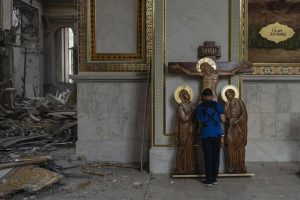
A boy kisses the statue of Jesus while helping clean up inside the Odesa Transfiguration Cathedral after the church was heavily damaged in Russian missile attacks in Odesa, Uk Jae C. Hong/Copyright 2023 The AP. All rights reserved
As for the Russian churches on the Ukrainian-controlled territory, the new law cannot avoid a much longer constitutional procedure before sanctioning them.
“According to the Ukrainian legislation the churches does not have a legal personality. Only the communities have a legal personality,” Archimandrite Hovorun said.
“These communities are registered in an ad hoc state record. And on the basis of this registration they enjoy some privileges, like, for example, discounted price for gas and electricity, or they can use for free municipal or state property”.
Proving a religious community’s affiliation with a patriarchate can be “a very difficult process that must go through the courts up to the European Court of Human Rights”, he said.
“And even if the Moscow affiliation of the community will be proven the worst sanction they willl have to pay is to be stripped of the rights to rent public property buildings,” concluded Archimandrite Hovorun from his residence in Kyiv.
Hovorun is now a scholar of ecumenism and International Relations at Sankt Ignatios, an intra-orthodox university college in Sweden.
He was a member of the Ukrainian Church under the Moscow Patriarchate. He used to work with the Russian Patriarch Kirill but was forced to quit after witnessing the Russian Orthodox Church’s increasing support for the Kremlin’s expansionistic ideology.
Hovorun was defrocked by the Russian patriarch himself, and as an academic researcher, he now responds only to the Ecumenic Patriarch of Constantinople.
‘Russian World,’ a case of hubris-meets-heresy
The Ukrainian law concerning the activities of the Moscow Patriarchate explicitly names one particular issue: “the danger of the ideology of the ‘Russian World’”.
The much-talked-about doctrine is seen as a blueprint for the Russian state and its proxies, providing cultural and ideological foundations for political action to bring Ukraine, Belarus, Moldova, and other eastern European communities under the Kremlin’s political control, either through territorial annexations or by extending the Russian sphere of influence.
Through his sermons, the current Moscow Patriarch, Kirill, has backed the doctrine by justifying Russian military aggressions and religious propaganda against neighbouring states — a de facto way to whitewash and justify the use of force by invoking Christian moral principles.
More than a thousand Orthodox Christian theologians and scholars from various countries have strongly condemned the “Russian World” idea:
“We reject the ‘Russian world’ heresy and the shameful actions of the government of Russia in unleashing war against Ukraine, which flows from this vile and indefensible teaching with the connivance of the Russian Orthodox Church, as profoundly un-Orthodox, un-Christian and against humanity,” they said in a statement in March 2022.
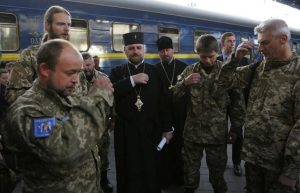
Ukrainian orthodox chaplains of Ukrainian Armed Forces pray as they prepare to leave Kiev Sergei Chuzavkov/AP
Although not outright banned, most Orthodox churches were closely monitored by Soviet authorities, especially during the Cold War.
Even the exiled religious communities based in the West were infiltrated by priests acting as undercover agents.
The alliance between President Vladimir Putin and Patriarch Kirill has rebooted those practices in the name of the “Russian World”.
While the Ecumenical Patriarch of Constantinople Bartholomew maintained extremely warm relations with the US since the Cold War, Patriarch Kirill actively used the church’s spiritual and ecclesiastical role to justify Russian expansionism.
Nonetheless, “no Orthodox church has condemned Kirill as a heretic, and one of the reasons is that problem with nationalism is rooted in almost all the Orthodox churches,” Dr Kouremos explained.
“If we try to accuse Kirill as a heretic because he’s a nationalist, we don’t know where we can stop because also in other churches, in Romania, in Georgia, in Serbia, we can find some traces of nationalism.”
You may like
Politics
‘Playing with fire’: Orbán’s sanctions veto threat puts Brussels on edge
Published
1 hour agoon
January 24, 2025By
Ekwutos Blog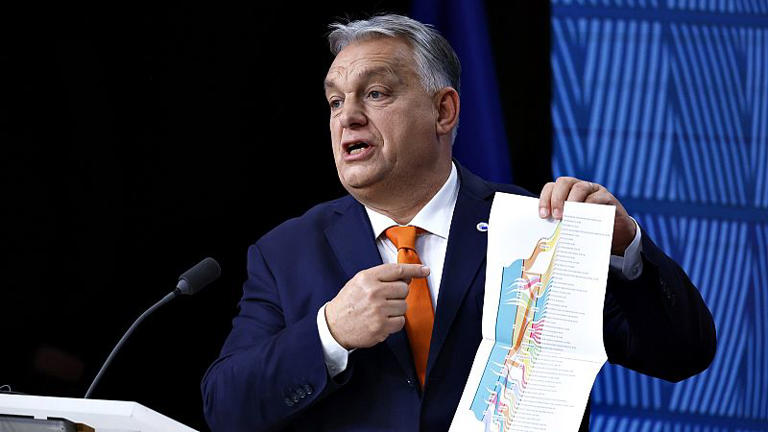
Diplomats and officials in Brussels are holding their breath as they wait to find out if Viktor Orbán’s increasingly critical rhetoric against EU sanctions will translate into a veto that could upend the bloc’s Russia policy, as soon as next week.
Since February 2022, the bloc has brought in sweeping bans on trade with Russia in energy, technology, finance, luxury goods, transport and broadcasting, among others. It’s also frozen €210 billion assets held by the Russian central bank within the bloc, which have been used to back a multi-billion-euro loan for Kyiv.
Those could all soon be put into question. The restrictions, designed to cripple Moscow’s ability to finance its full-scale invasion of Ukraine, need to be prolonged every six months by unanimity, and the next deadline is 31 January.
In recent days, Orbán and his deputies have ratcheted up their harsh words against the sanctions regime, arguing the inauguration of US President Donald Trump, who wants to negotiate with Russia’s Vladimir Putin, requires the bloc to rethink its longstanding stance.
“The question of extending the sanctions is now on the agenda, and I pulled the handbrake and asked European leaders to understand that this cannot be continued,” the Hungarian Prime Minister said in a radio interview on Friday morning.
One of his ministers, Gergely Gulyás, has openly questioned the six-monthly renewal. “So far, everyone has seen the extension of sanctions as automatic, but we do not think it is automatic now,” Gulyás said on Thursday.
Those comments have stoked fears that Hungary will use its veto to block the rollover, triggering the collapse of a sanctions regime painstakingly built across 15 packages, and depriving the EU of its most hard-hitting tool against the Kremlin.
“It’s clear that if Budapest were to block, we would have a great issue at hand,” said a senior diplomat, who spoke on condition of anonymity due to the sensitivity of the matter. “Budapest is playing with fire.”
The diplomat described the political situation as “mind-blowing” given the dire battleground conditions faced by Ukrainian forces, and predicted the EU would plunge into “uncharted territory” were sectoral sanctions to collapse overnight.
“The shenanigans we get from Budapest are seemingly endless,” the diplomat said.
A closed-door discussion among ambassadors on Friday only increased the uncertainty, as the Hungarian representative maintained ambiguity over his position, several diplomats said.
Instead, Hungary asked to change the agenda of Monday’s meeting of foreign affairs ministers, to allow the item on sanctions renewal, which is generally approved without any fuss, to be openly debated after a separate discussion on Ukraine support.
The Hungarian envoy also made a number of requests concerning energy policy, and in particular Ukraine’s recent decision to terminate the transit of Russian gas through Hungary, another diplomat said.
The decision, taken by President Volodymyr Zelenskyy to stop Moscow from earning “additional billions on our blood,” has met with a furious reaction from Hungary and Slovakia, two landlocked countries that still purchase Russian fossil fuels. Earlier this month, Slovak Prime Minister Robert Fico threatened to use his veto power in retaliation.
‘Transactional’ diplomacy
In his radio interview, Orbán made a direct link between sanctions renewal and the gas dispute, and asked the European Commission to intervene in his country’s favour.
The Commission has said it has “no interest” in extending the transit of Russian gas.
“What is closed now, has to be reopened again. This is not a matter for Ukraine, it is an issue for Europe, an issue for central Europe,” the prime minister said.
“If the Ukrainians want help, for example sanctioning the Russians, then let’s reopen the gas transit routes and allow the central European countries, including Hungary, to receive the gas we need through Ukraine.”
The connection between the two issues has left diplomats scratching their heads, trying to figure out how severe the latest threat actually is. Orbán has previously used his veto to extract concessions, but never to provoke such a disruptive effect on sanctions.
“The threats are taken seriously. But it’s not the first time,” a diplomat said, decrying Hungary’s “transactional” manner of making demands.
“The EU cannot enter into panic mode every time somebody says something in Budapest,” they added. “We have learned to make a clear distinction between what we hear in Budapest and what happens in Brussels.”
The suspense is likely to last, at least, until foreign affairs ministers meet on Monday and Hungary’s representative, Péter Szijjártó, announces his country’s position. Diplomats speculate that, despite the harsh talk, Szijjártó will back down if he can secure new EU assistance for Hungary’s energy needs.
This will pave the way for the renewal to be approved, if not on Monday, then at least before the end of the month.
“We expect a positive result from that discussion. [Sanctions] are a key part of our strategy,” said a high-ranking EU official. The issue of gas transit has “nothing to do with sanctions on Russia. Sanctions on Russia are because of the aggression.”
Asked if Brussels was already drafting a Plan B, the official said: “We don’t envisage any other possibility than that it will be approved in the coming days.”
One factor certain to influence the discussion are the latest comments made by Donald Trump, who took some observers by surprise with hawkish comments against Russia.
“If we don’t make a deal, and soon, I have no other choice but to put high levels of taxes, tariffs, and sanctions on anything being sold by Russia to the United States, and various other participating countries,” Trump said.
“We can do it the easy way, or the hard way – and the easy way is always better.”
The EU is already preparing a 16th package of sanctions against Russia, with the view to approving them before the third anniversary of the invasion, in late February.
Politics
Donald Trump To Reduce Oil Prices Worldwide
Published
3 hours agoon
January 24, 2025By
Ekwutos Blog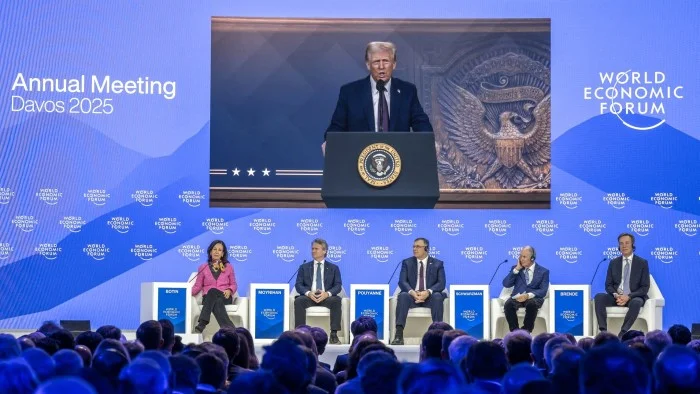
Donald Trump has reportedly urged Opec and Saudi Arabia to lower global oil prices and called for central banks worldwide to reduce interest rates immediately after.
Speaking to business leaders in Davos on Thursday, the former US president criticized oil producers for not acting sooner to reduce crude oil costs.
“I’m going to ask Saudi Arabia and Opec to bring down the cost of oil. You gotta bring it down. Frankly, I’m surprised they didn’t do it before the election,”Trump said.
He suggested that lowering oil prices could help stop Russia’s war in Ukraine, saying,
“Right now, the price is high enough that the war will continue. Bring it down, and you could end that war.”
Trump also encouraged global companies to manufacture their products in the US, warning them of heavy tariffs if they import goods into the American market.
He promoted his economic policies, including large tax cuts and reduced regulations, describing them as a “revolution of common sense.”
This is an ongoing story.
Politics
President Bola Ahmed Tinubu has appointed board chairpersons for 42 federal organisations and a secretary to the board of the Civil Defence, Immigration, and Prisons Services.
Published
6 hours agoon
January 24, 2025By
Ekwutos Blog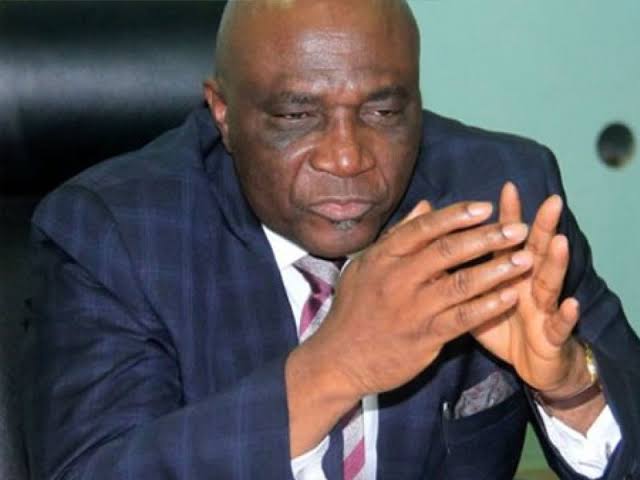
STATE HOUSE PRESS RELEASE
APPOINTMENT OF BOARD CHAIRPERSONS AND CEOS
President Bola Ahmed Tinubu has appointed board chairpersons for 42 federal organisations and a secretary to the board of the Civil Defence, Immigration, and Prisons Services.
The President has also appointed a new managing director for the Nigerian Railway Corporation and a director-general for the National Board for Technology Incubation (NBTI).
President Tinubu directs the board chairpersons not to interfere with the management of the organisations, emphasising that their positions are non-executive.
All the appointments take immediate effect.
1. NATIONAL YOUTH SERVICE CORPS, MINISTRY OF YOUTH DEVELOPMENT
– Hon. Hillard Eta Chairman (Cross River)
2. NIGERIAN INSTITUTE OF INTERNATIONAL AFFAIRS
– Prof. Bolaji Akinyemi, Chairman (Lagos)
3. FEDERAL AIRPORT AUTHORITY OF NIGERIA, MINISTRY OF AVIATION
– H. E. Abdullahi U. Ganduje, Chairman (Kano)
4. NATIONAL SUGAR DEVELOPMENT COUNCIL
– Sen. Surajudeen Bashiru Ajibola, Chairman (Osun)
5. NIGERIA BULK ELECTRICITY TRADING COMPANY
– H. E. Sulaiman Argungu, Chairman (Kebbi)
6. NATIONAL AGENCY FOR GREAT GREEN WALL
– Sen. Magnus Abe, Chairman (Rivers)
7. NATIONAL TEACHERS INSTITUTE
– Barr. Festus Fuanter, Chairman (Plateau)
8. NATIONAL BOARD FOR TECHNOLOGY INCUBATION (NBTI)
– Raji, Kazeem Kolawole, Director-General (Oyo)
9. NIGERIAN INSTITUTE OF EDUCATIONAL PLANNING AND ADMINISTRATION
– Chief Victor Tombari Giadom, Chairman (Rivers)
10. TEACHERS REGISTRATION COUNCIL OF NIGERIA
– Comrade Mustapha Salihu, Chairman (Adamawa)
11. INDUSTRIAL TRAINING FUND
– Hon. Hamma Adama Ali Kumo, Chairman (Gombe)
12. NIGERIAN INSTITUTE OF SCIENCE LABORATORY TECHNOLOGY
– Donatus Enyinnah Nwankpa, Chairman (Abia)
13. SHEDA SCIENCE AND TECHNOLOGY COMPLEX
– Sen. Abubakar Maikafi, Chairman (Bauchi)
14. FEDERAL MORTGAGE BANK OF NIGERIA
– H. E. Nasiru Gawuna, Chairman (Kano)
15. NATIONAL OFFICE FOR TECHNOLOGY ACQUISITION AND PROMOTION
– Sen. Tokunbo Afikuyomi, Chairman (Lagos)
16. NIGERIAN POSTAL SERVICE
– Chief D. J. Kekemeke, Chairman (Ondo)
17. NATIONAL INLAND WATERWAYS AUTHORITY
– Hon. Musa Sarkin Adar, Chairman (Sokoto)
18. NATIONAL STEEL COUNCIL
– Prof. Abdulkarim Kana Abubakar, Chairman (Nasarawa)
19. NATIONAL ENVIRONMENTAL STANDARDS AND REGULATIONS
ENFORCEMENT AGENCY
– Hon. Garba Datti Muhammad, Chairman (Kaduna)
20. NATIONAL BIO-SAFETY MANAGEMENT AGENCY
– Mu’azu Bawa Rijau, Chairman (Niger)
21. NIGERIAN BUILDING AND ROAD RESEARCH INSTITUTE
– Hon. Durosimi Meseko, Chairman (Kogi)
22. FEDERAL TEACHING HOSPITAL, GOMBE
– Hajia Zainab A. Ibrahim, Chairman (Taraba)
23. NIGERIAN RAILWAY CORPORATION
– Dr.Kayode Isiak Opeifa, Managing Director (Lagos)
24. FEDERAL TEACHING HOSPITAL, IDO-EKITI
– Aare (Hon.) Durotolu Oyebode Bankole, Chairman (Ogun)
25. FEDERAL MEDICAL CENTRE, ABEOKUTA
– Mr Abdullahi Dayo Israel, Chairman (Lagos)
26. FEDERAL MEDICAL CENTRE, ASABA
– Dr. Mrs. Mary Alile Idele, Chairman (Edo)
27. FEDERAL MEDICAL CENTRE, LOKOJA
– Nze Chidi Duru (OON), Chairman (Anambra)
28. FEDERAL MEDICAL CENTRE, OWERRI
– Hon. Emma Eneukwu, Chairman (Enugu)
29. CIVIL DEFENCE, IMMIGRATION AND PRISONS SERVICES BOARD
– Major Gen. Jubril Abdulmalik Rtd, Secretary (Kano)
30. FEDERAL MEDICAL CENTRE, UMUAHIA
– Mr. Uguru Mathew Ofoke, Chairman (Ebonyi)
31. FEDERAL MEDICAL CENTRE, YENAGOA
– Barr. Felix Chukwumenoye Morka, Chairman (Delta)
32. FEDERAL MEDICAL CENTRE, YOLA
– Alh. Bashir Usman Gumel, Chairman (Jigawa)
33. DAVID UMAHI FEDERAL UNIVERSITY TEACHING HOSPITAL, UBUHU, EBONYI STATE
– Dr. Ijeoma Arodiogbu, Chairman (Imo)
34. NATIONAL OIL SPILL DETECTION AND RESPONSE AGENCY
– Chief Edward Omo-Erewa, Chairman (Edo)
35. NIGERIAN MARITIME ADMINISTRATION AND SAFETY AGENCY (NIMASA)
– Yusuf Hamisu Abubakar, Chairman (Kaduna)
36. NNAMDI AZIKIWE UNIVERSITY TEACHING HOSPITAL, NNEWI, ANAMBRA STATE
– Hon. Ali Bukar Dalori, Chairman (Borno)
37. AHMADU BELLO UNIVERSITY TEACHING HOSPITAL, SHIKA, ZARIA,
KADUNA STATE
– Hon. Lawal M. Liman (Chairman)
38. FEDERAL MEDICAL CENTRE KATSINA
– Dr. Abubakar Isa Maiha (Chairman)
39. RAW MATERIALS RESEARCH AND DEVELOPMENT COUNCIL (RMRDC)
– Isa Sadiq Achida, Chairman (Sokoto)
40. FEDERAL MEDICAL CENTRE BIRNIN KUDU
– Dr. Mohammed Gusau Hassan, Chairman Zamfara
41. NATIONAL BUILDING AND ROAD RESEARCH INSTITUTE
– Hon. Yahuza Ado Inuwa, Chairman (Nasarawa)
42. SOKOTO-RIMA RIVER BASIN DEVELOPMENT AUTHORITY
– Amb. Abubakar Shehu Wurno, Chairman (Sokoto)
43. AMINU KANO TEACHING HOSPITAL
– Augustine Chukwu Umahi, Chairman (Ebonyi)
44. FEDERAL SCHOLARSHIP BOARD
– Engr. Babatunde Fakoyede, Chairman (Ekiti)
45. NIGERIAN SOCIAL INSURANCE TRUST FUND
– Hon. Shola Olofin, Chairman (Ekiti)
Bayo Onanuga
Special Adviser to the President
(Information & Strategy)
January 23, 2025

Ending Russia’s war in Ukraine this year is possible, says ex-NATO chief Stoltenberg

‘Playing with fire’: Orbán’s sanctions veto threat puts Brussels on edge

Nigerian Customs Service Warns of Fake Emails and Messages
Trending
- Politics11 months ago
Nigerian Senate passes Bill seeking the establishment of the South East Development Commission.

 Business11 months ago
Business11 months agoInflation hits record high of 29.90% on naira weakness

 Politics8 months ago
Politics8 months agoBREAKING: Federal Gov’t Offers To Pay Above N60,000, Reaches Agreement With Labour

 SportsNews11 months ago
SportsNews11 months agoOlympic Qualifiers 2024: CAF Confirms Dates For Super Falcons Vs Banyana Banyana

 Trending3 months ago
Trending3 months agoNYA demands release of ‘abducted’ Imo chairman, preaches good governance
- Business3 months ago
US court acquits Air Peace boss, slams Mayfield $4000 fine

 Politics3 months ago
Politics3 months agoMexico’s new president causes concern just weeks before the US elections

 Politics11 months ago
Politics11 months agoGovernor Hope Uzodinma’s New Cabinet In Imo: The Gainers, The Losers

